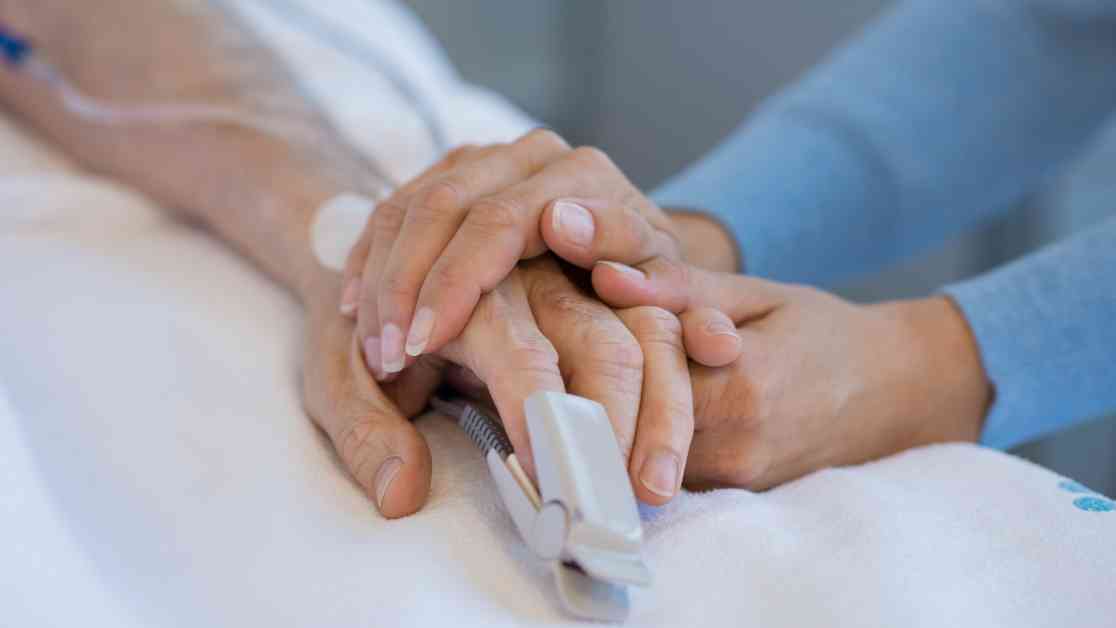Watching my mother slowly succumb to the ravaging effects of Alzheimer’s disease has been a heartbreaking and deeply personal experience. As her voice fades and her body weakens, I see the desperation in her Irish blue eyes, longing to communicate with me in her final moments. It is a cruel and undignified death, one that I believe she would not have chosen had she known her fate back in 2020 when she was diagnosed with dementia.
Despite witnessing firsthand the agonizing journey that my mother is enduring, I find myself unable to support the assisted dying bill currently being championed in Parliament by MP Kim Leadbeater. The fear that vulnerable individuals, such as the terminally ill, could be coerced or feel pressured to choose assisted dying weighs heavily on my decision. The ever-changing safeguards proposed by Leadbeater do not instill confidence in me that adequate protection will be provided to those who may be manipulated into making such a final decision.
My personal reservations about the bill are further fueled by the experiences I have had navigating the system for my disabled daughter, who is now 23 years old. The failures of the state machinery to adequately support and safeguard individuals like my daughter cast doubt on the effectiveness of the proposed expert panel that Leadbeater has suggested would oversee the assisted dying process. The sudden shifts in the composition of this panel, from High Court judges to a lawyer, a social worker, and a psychiatrist, only serve to raise more concerns about the thoroughness and reliability of the decision-making process.
As a parent who has seen firsthand the discrepancies and deficiencies in the care system, I cannot help but question the validity of entrusting such critical life-and-death decisions to a panel that may lack the necessary expertise and empathy required for such weighty matters. The implications of this bill extend far beyond the scope of a single individual’s choice, impacting the lives of countless vulnerable individuals who may be swayed or influenced by external factors.
Expert Insights: Advocating for a Holistic Approach
In my pursuit of understanding and grappling with the complexities of the assisted dying bill, I had the opportunity to engage with renowned brain surgeon Henry Marsh, a passionate advocate for choice in end-of-life decisions. Marsh’s personal experience with advanced prostate cancer lends a unique perspective to his advocacy for assisted dying, yet even his compelling arguments could not fully assuage my concerns about the potential pitfalls and unintended consequences of such legislation.
Marsh’s unwavering commitment to advocating for humane choices in end-of-life care serves as a reminder of the delicate balance between autonomy and protection that must be carefully navigated in discussions surrounding assisted dying. The case of Peter Sefton-Williams, who was misdiagnosed with a fatal condition and nearly pursued assisted death before a correct diagnosis saved him from a premature end, underscores the critical importance of rigorous safeguards and comprehensive assessments in safeguarding vulnerable individuals from irreversible decisions.
Navigating the Moral Quandary: Personal Reflections
As I grapple with the moral and ethical implications of the assisted dying bill, I am faced with a profound sense of uncertainty and anguish. The haunting gaze of my mother, silently beseeching me to either save her from her suffering or let her go, weighs heavily on my heart. The prospect of doctors suggesting assisted dying as an option, particularly for individuals like my mother who may be vulnerable to manipulation or coercion, raises troubling questions about the potential for abuse and exploitation in the implementation of such legislation.
In the midst of this emotional turmoil and ethical dilemma, I am reminded of the inherent value of life and the need for a more holistic approach to end-of-life care. Rather than prioritizing the right to die over the right to live, I implore lawmakers to consider investing in robust palliative care, enhancing social support systems, and empowering disabled individuals to lead fulfilling lives. The legacy of my mother and the enduring spirit of my daughter compel me to advocate for a more compassionate and inclusive approach to end-of-life decision-making, one that prioritizes dignity, autonomy, and the sanctity of life.
As I stand at this crossroads of personal grief and moral reflection, I am reminded of the profound responsibility we bear in shaping the future of end-of-life care and the enduring impact our choices will have on generations to come. In a world fraught with complexities and uncertainties, it is our shared humanity and compassion that must guide us towards a future where every life is valued, respected, and honored in all its complexity and vulnerability.













